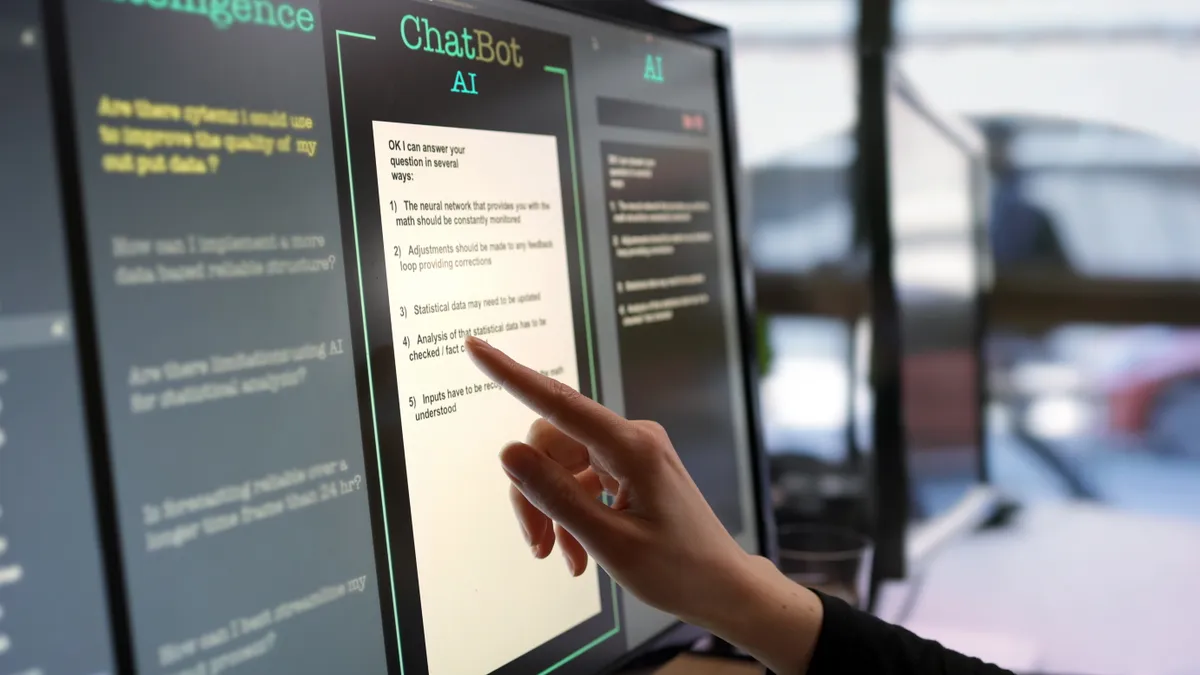New laws, approaches to student success and discipline, and classroom learning models dominated conversation in K-12 this year as the industry continued moving away from the industrial model of the last century toward "School 2.0."
The Every Student Succeeds Act loomed large as the rulemaking process took full swing ahead of its 2017 implementation, and startups from Silicon Valley and new approaches from private schools offered lessons in innovation for the entire industry.
In that spirit of change and innovation, we present the 2016 Dive Awards for K-12 education.
These awards are the byproduct of months of work and research that began in January. We solicited suggestions for nominees from readers in August before consulting industry insiders to help us narrow down the choices. Ultimately, the winners were chosen by the editors of Education Dive. Here are our 10 winners for 2016:
School/District of the year
Winner: New Hampshire’s Sanborn Regional, Rochester, Epping and Souhegan School Districts
Rethinking approaches to assessment is top of mind for school districts nationwide, as the value of annual standardized exams under the now-replaced No Child Left Behind Act has been called into question. The Sanborn Regional, Rochester, Epping and Souhegan School Districts in New Hampshire, however, have done significant work to make progress on that front.
The districts' Performance Assessment for Competency Education (PACE) pilot minimizes the amount of testing students are subjected to annually and is intended to more accurately reflect students' daily work, lessening the need to "teach to the test." It was approved by the U.S. Department of Education in 2015 to provide data on future approaches to testing—a critical focus of the soon-to-be-implemented Every Student Succeeds Act.
With testing scrutiny prominent in today’s ed debates, the work of these four New Hampshire districts to pioneer a competency-based approach that aligns more closely align with students’ daily work is sure to be influential in efforts to improve exams nationwide.
Other nominees: DC Public Schools, St. Clair R-XIII School District (MO), Tustin Unified School District (CA), KIPP Public Charter Schools
Administrator of the year
Winner: Dr. Jessica Ainsworth, former assistant principal at Lithia Springs High School in Georgia
Now the assistant director of assessment for Georgia's Douglas County School System, Dr. Jessica Ainsworth made a huge impact with her work as assistant principal at the district's Lithia Springs High School. With a focus on improving student achievement, remediation and disciplinary practices, her "MANE Thing" initiative helped transform the school from "at-risk" to one of seven state-certified STEM schools. It has additionally won the 2016 SSTAGE STAR award and the 2016 High Flying Schools Award.
"I am honored to receive the 2016 K-12 Administrator of the Year from Education Dive," Ainsworth said. "In a time of multiple mandated changes, implementation of researched-based instructional strategies, a school improvement grant, transitioning to a Title I school, and a new evaluation system, the odds were against our success at Lithia Springs High School."
"As school leaders, our messages to our staff can be lengthy, overwhelming, and may portray a lack of clear purpose," she said. "By creating a shared vision of academic success, The MANE Thing identified the organization’s vision to increase student learning."
"By creating a shared vision of academic success, The MANE Thing identified the organization’s vision to increase student learning."

Dr. Jessica Ainsworth
Assistant Director of Assessment, Douglas County School System
In her new role, she says she's able to scale the model to help other schools, and that maintaining clear purpose and being a "path changer" is key. She had plenty of fellow path changers among her competition for the award, including Coachella Valley USD's "rock and roll superintendent," Darryl Adams, and Newtown Public Schools Superintendent Joseph Erardi, who's ongoing SEL efforts are helping his district continue its recovery from the 2012 Sandy Hook tragedy.
Other nominees: Jimmy Casas, principal at Bettendorf High School in Iowa; Darryl Adams, superintendent of Coachella Valley Unified School District in California; Joseph Erardi, superintendent of Newtown Public Schools; Ron Clark, founder of Ron Clark Academy in Georgia
Most disruptive/innovative idea
Winner: Unlearning
As many a "Star Wars" fan knows, unlearning what he had learned was critical to hero Luke Skywalker's training at the hands of Yoda. And like "The Empire Strikes Back," research on the real-world educational concept dates back to the 1980s, as well.
As Harvard University's Marga Biller explained to us in August, unlearning is "the process of learning to think, behave or perceive in a new way when there are already beliefs, behaviors or assumptions in place that threaten such progress." How exactly that happens can differ from school to school, though—and it includes some approaches to "growth mindset" and "grit."
A number of other trends also bred disruption in the K-12 school model this year. Makerspaces in particular gathered their share of attention, bolstered by the Obama administration's continued support of tech in schools. And restorative justice efforts made headway amid increasing pressure to reform student discipline and stem the school-to-prison pipeline.
Other nominees: AltSchool, makerspaces, restorative justice
Turnaround of the year
Winner: Premont Independent School District
The word "turnaround" in K-12 often evokes the spotty track record associated with state takeovers of failing schools or districts. For the Premont Independent School District in South Texas, however, community assistance provided the boon to help it change course.
When the district was faced with losing its accreditation in 2011, local residents voted overwhelmingly to increase property taxes by $0.13 per $100 of assessed value. The district also received $315,000 in donations from local foundations, businesses and other donors to help shore up its finances. But equally important, the local higher ed community came to its aid, with Texas A&M University providing grant-writing prowess, teacher training on curriculum and instruction, and raising $8 million to hire five master teachers to support rookie educators.
Also grabbing attention for their efforts this year were remediation efforts that significantly boosted the Los Angeles Unified School District's graduation rates and Memphis' "Innovation Zone" schools, which have outperformed other at-risk schools in the district taken over by the state—though the efforts have raised questions of rigor and sustainability, respectively, from critics.
Other nominees: Los Angeles Unified School District, Memphis “Innovation Zone” schools
Startup of the year
Winner: AltSchool
With the ed tech boom of recent years, there's no shortage of interesting startups in K-12. While the vast majority are vendors offering products to improve everything from learning to school/district operations, perhaps the most intriguing are startup schools themselves.
Among these, AltSchool's "microschool" approach, which eschews traditional grade level structures and curriculum, has gained traction with funding from the likes of Mark Zuckerberg and expansion beyond California to Brooklyn and Chicago. Founded by former Google Head of Personalization Max Ventilla, the school is also now sharing its proprietary tech with a handful of partner schools.
Aforementioned funder Mark Zuckerberg and wife Priscilla Chan also fell into contention for top startup with their Primary School, as did the Summit Public Charter Schools' innovative Personalized Learning Platform, now used by a variety of schools and districts nationwide.
Other nominees: The Primary School, Summit Personalized Learning Platform, Sphero, zSpace
Obsession of the year
Winner: Every Student Succeeds Act
The passage of the Every Student Succeeds Act, a reauthorization of the LBJ-era Elementary and Secondary Education Act, late last year was hailed as a "Christmas miracle" by President Barack Obama because of the rare bipartisan victory it represented for both parties in Congress. For much of 2016, the K-12 world was focused on preparing for fall 2017, when the new law is set to replace the much-maligned No Child Left Behind Act—and there's no shortage of changes coming with the new law.
Returning a significant amount of power to state and local officials, the law notably calls for a scaling back of standardized testing, expanding preschool access, more state control of accountability standards and teacher evaluation processes, and new rules around Title I spending. There has already been pushback against the Department of Education during the rulemaking process for the law, though the department will likely see a diminished role regardless under the incoming Trump administration.
While an uptick in focus on the benefits of SEL and virtual reality in classrooms were also obsessions for many, nothing dominated conversation this year quite like ESSA.
Other nominees: 3D printing and makerspaces, social-emotional learning, virtual reality, unlearning
Policy of the year
Winner: Transgender bathroom regulations
Though the Every Student Succeeds Act was also a contender for this category, it was perhaps equaled by debate around the Obama administration's contentious guidelines over transgender bathroom access in schools.
All together, a total of 21 states sued the administration over threats to funding for noncompliance with the directive, arguing that protections under the Civil Rights Act and Title IX don't extend to transgender individuals as written. The Supreme Court is now set to decide on the case when it hears the appeal of Virginia's Gloucester County School Board against Gavin Grimm, a transgender student who is fighting for the right to use the boys’ bathroom.
Whether they'll decide before President-elect Donald Trump and a fully GOP-controlled Congress can appoint a new justice, or how those factors will influence the decision of the court's more centrist judges, leaves the outcome in question—though the regulations are unlikely to be upheld.
Other nominees: Every Student Succeeds Act, efforts to mitigate school-to-prison pipeline, focus on chronic absenteeism for first time in Civil Rights Data Collection
Legal battle of the year
Winner: Standardized testing opt-out movement
While it wasn't a legal battle with an actual court case, the standardized testing opt-out movement is in prime position to move to that level.
Under the movement, a number of parents have chosen to opt their children out of annual state standardized exams, which were increasingly tied to school grades and teacher evaluations under the No Child Left Behind Act and the Obama administration. The numbers rose so high in some states, like New York, that the Department of Education has threatened funding penalties for schools without 95% participation. How changes to exams under the Every Student Succeeds Act, as well as the Trump administration's approach to education, impact the movement will likely help opt-outs remain a hot topic over the next two years at least.
Other nominees: McCleary, et al. v. State of Washington; Vergara v. California; Friedrichs v. California Teachers Association et al.; Gloucester County School Board v. G.G.; The People of the State of California v. K12 Inc.; United States v. Texas
Best investment
Winner: Early childhood/pre-k programs
Perhaps the biggest investments highlighted in K-12 in recent years have been 1:1 device programs. And while tech can benefit classroom instruction, its influence is arguably not as far-reaching as another increasingly popular K-12 investment: preschool.
There's plenty of research showing the benefits of pre-k. According to one recent study from the American Institutes for Research, for example, children who attended center-based care the year before starting kindergarten performed better—with improved learning approaches, more cognitive flexibility and better math scores—than peers who did not. This correlates later to better student success down the road, additionally reducing the need for special ed for many students.
Under ESSA, pre-existing Preschool Development Grants designed to “support coordination and alignment of states’ early learning systems” and “expand access to preschool” will become permanent. And states will also be required to align academic standards with relevant early learning guidelines, allowing districts to use Title I funding to expand access to early education.
Other nominees: 1:1 device programs, social-emotional learning curriculum, restorative justice disciplinary models, ELL support
Biggest miss
Winner: Making teaching more appealing as a career field
For much of the past year, observers have lamented K-12's lack of status as a key topic in the presidential race. But, as some have argued, education's localized nature doesn't always lend itself to national debate or direct impact via voting.
In an era of major teacher shortages for many districts, the biggest miss is more likely the lack of effort put into making teaching more appealing as a career field. This effort could have arguably been done in the Every Student Succeeds Act. It could have also been done when the Department of Education issued new regulations for teacher prep programs.
Overall, low pay and a fair amount of teacher blaming from officials like former Secretary of Education Arne Duncan and members of the ed reform movement have contributed to making the profession less than desirable. Solving part of that equation will require additional funding for raises—though it's unlikely anyone is holding their breath on that front.
Other nominee: K-12 education as topic in presidential race
The 2016 Dive Awards were distributed across our twelve vertical markets: BioPharma, CIO, Construction, Education, Food, Healthcare, HR, Marketing, Retail, Supply Chain, Utility, and Waste. Click here to see all of the Dive Awards winners.








 Dive Awards
Dive Awards














